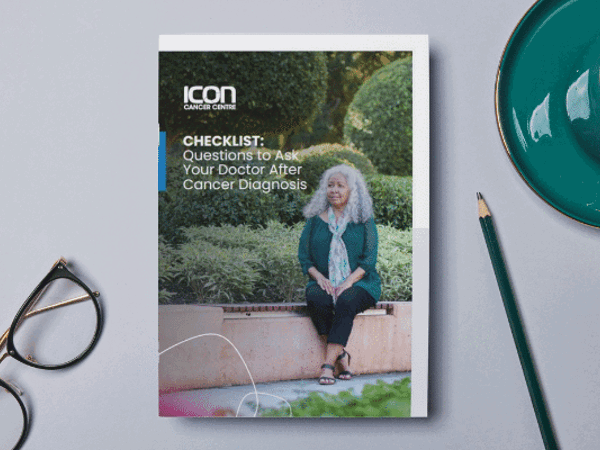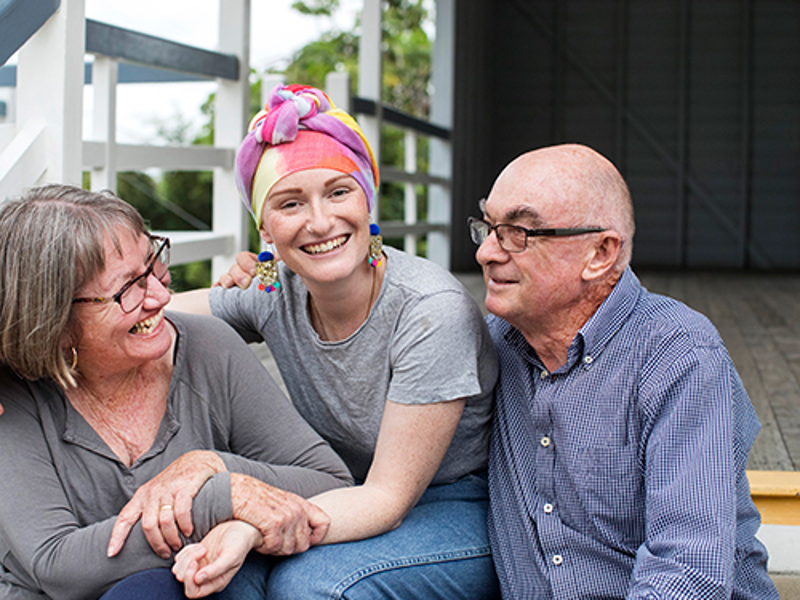
Everything you need to know about scalp cooling
Many aspects of your life will be affected and need to be considered at once, including considerations of finances, work, child-minding and relationships, as well as the physical demands and side-effects of the cancer treatment itself. 1
Having a plan that can help reduce and manage stress will enable you to more effectively cope during your cancer treatment. 4 Below are a list of tools and strategies that may be helpful in managing your stress during treatment.
Feeling informed about your diagnosis and treatment can be a powerful tool for managing stress levels during your cancer journey. Asking your specialist team about your treatment options and side-effects will help you manage your expectations, as well as help you feel more in control of the decisions you are making around your treatment.
Don’t be afraid to get second opinions, and talk your decisions through with your friends and family as well. 5
Be more informed and play an active role in your own cancer care.

Depending on your type of cancer and treatment, you may want to consider how your finances will be impacted during this time. For example: 3
Will you need to take time off work for treatment?
How much will your tests and medications cost? Do you have health insurance that will cover this?
Are there other sources of income available to you, such as benefits?
Do you have a budget in place to help manage income and expenses?
Have you set up automatic direct debits to manage routine bills?
Complementary therapies are commonly used by people in Australia undergoing cancer treatment to help manage side-effects and stress. Before commencing any complementary therapy, you should discuss this will your specialist or cancer-care team. 16
Complementary therapies can provide emotional and physical support, as well as help relieve side-effects from treatment and restore a sense of balance and control over your life. 7
These may include:
Meditation
Relaxation techniques
Counselling
Where possible, it is important to allow your friends and family to help you during this time and they will appreciate being able to help, and to feel needed. Some things they could do to help include: 6
Going with you to your treatments and specialist appointments
Helping with household chores (i.e. cooking, cleaning)
Running errands – such supermarket shopping and ensuring routine bills are paid on time
Looking after children; doing school pick-ups and drop-offs
Being a point of contact for information to other family and friends on your behalf
Being there to talk and offer emotional support
Be your exercise buddy

Cancer treatments are designed to destroy cancer cells; however they can also destroy healthy cells, causing side-effects (such as nausea, vomiting, mouth ulcers, difficulty swallowing as well as diarrhoea and constipation) which can impact on your ability and willingness to eat and drink. 11
Eating a balanced diet will not only help you manage stress during your treatment, it will also:
Help repair damaged cells and tissue from treatment
Improves immune function and assists your body in fighting infection
Assists in weight management and prevents malnutrition
Helps to manage some side-effects of treatment.
Tips to eating a balanced diet include:
Choose foods from a variety of food groups. Cancer Council recommend eating based on the Australian Food Guidelines during cancer treatment.
Eat small and frequent meals to help with digestion as well as increasing your calorie intakes.
Recipe and snack ideas from the Cancer Council.
Exercise has many benefits (including stress-reduction) for people with cancer. According to the Clinical Oncology Society of Australia (COSA), it is recommended you should participate in physical activity before, during and after your cancer treatments. 9 It is important that you speak to a specialist, such as an accredited physiotherapist or physiologist so that your exercise programme can be tailored to your current level of fitness, whilst accommodating for your type of cancer, prognosis and any adverse effects you may be experiencing from your current treatments.9
COSA exercise recommendations include both aerobic and resistance-based exercises:
At least 150 minutes of moderate-intensity exercise or 75 minutes of high-intensity exercise per week – such as jogging, swimming or cycling. 9
Two to three sessions of moderate or high-intensity resistance exercise –such as lifting weights, and these sessions should target all of your major muscle groups. 9
Getting enough, regular sleep each night will allow your body to cope with your cancer treatment and associated stress better. 10
Things that can help you achieve adequate sleep include:
Going to bed at a regular time each night
Ensuring you have a dark, quiet place to sleep, away from lights, phones and other devices.
Exercise regularly
Don’t eat too late at night, as it can cause stomach discomfort and prevent you falling asleep
Try to avoid caffeine from early afternoon, such as tea, coffee or cola drinks. Caffeine takes a long time to process in the body, which means its’ effects can be long-lasting
The content on the Icon Cancer Centre website is for informational purposes only and should not be considered medical advice. It is not a substitute for consultation with a qualified medical practitioner. For personalised medical guidance, please consult with your GP or another qualified healthcare provider.

Discover our comprehensive collection of content designed to inform, support, and guide you through every aspect of cancer care. From the latest news and updates to personal patient experiences and educational resources, these materials provide valuable insights to help you better understand cancer, treatment options, and the journey ahead.